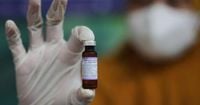On the winding roads of Sumenep, a city on Indonesia’s Madura Island, three health care workers balance blue medical boxes on their motorbikes, weaving through neighborhoods with a mission that’s become both urgent and controversial. Their task? Delivering life-saving measles vaccines door-to-door, one child at a time. For the past nine months, Madura has been at the epicenter of a measles outbreak that has infected more than 2,600 children and claimed the lives of 20, according to the Associated Press. The outbreak, which began in late 2024, shows no sign of abating, and the stakes could not be higher.
But the fight to contain measles in Indonesia—the world’s largest Muslim-majority nation—faces a challenge that goes beyond logistics or public health infrastructure. It’s a dilemma rooted in faith, tradition, and the complexities of modern medicine: some of the most widely available measles vaccines contain a stabilizer derived from pigs, an animal considered ritually unclean in Islam. This has fueled vaccine hesitancy among segments of the population, threatening to undermine efforts to halt the disease’s deadly march.
The regional government, recognizing the severity of the crisis, launched an ambitious campaign in August 2025 to distribute more than 78,000 vaccine doses across Sumenep and surrounding areas. These shots are being administered through local clinics, home visits, and even at schools, in hopes of reaching every vulnerable child. Yet, as Musthafa, general secretary of the local Indonesian Ulema Council, explained, "We have high hopes for Muslims in Indonesia, who are the ones consuming it. Let us ask the government, in this case the Health Office and the Ministry of Health, to find a halal vaccine." The request is simple, but the solution is anything but.
Pork-derived gelatin, used as a stabilizer in many vaccines, is essential for maintaining their safety and efficacy during storage and transport. For religious communities that view pigs as haram, or forbidden, this presents a profound ethical quandary. As AP reports, many Islamic scholars have clarified that vaccines containing pig-derived ingredients can be used under certain conditions—especially when no alternatives exist and the health of the community is at stake. In 2018, Indonesian religious leaders ruled that such vaccines were indeed haram but advised Muslims to use them until halal alternatives became available, "for the benefit of society," said Ahmad Syamsuri, head of Disease Control and Prevention at the Sumenep Health Office.
Despite this guidance, vaccine hesitancy persists. Pujiati Wahyuni, a 31-year-old Muslim mother and nurse, understands the struggle firsthand. "Yes, there are some. Islam is a big religion. Maybe some Muslim people just do not want to get vaccinated, and it is not just now, but since they were born," she told the Associated Press. Even within her own community, she’s seen parents refuse the vaccine for their children on religious grounds. Still, Wahyuni chose to have her daughter vaccinated at an Islamic kindergarten in Pamolokan village, weighing the risks and benefits carefully.
For others, the decision is fraught with anxiety but ultimately driven by fear of the disease’s severity. Ayu Resa Etika, a 28-year-old mother from Kebunan village, delayed her son’s second dose of the vaccine due to doubts about its halal status. But as the outbreak worsened and local hospitals filled with measles patients, her resolve changed. "There is a little doubt because it is not halal. But despite all that, this is for the sake of the child’s health," she explained. "The effects are quite extraordinary; it can cause death. I am afraid that if my son is not vaccinated against measles, that is the risk. So it’s OK, as long as the effects are good."
The numbers underscore the urgency. During the peak of the outbreak, from May to July 2025, regional hospitals in Sumenep were overwhelmed, with staff treating over a hundred measles cases daily. The isolation rooms were full, and the pressure on health workers was relentless. Yet, despite these dire circumstances, the regional government cannot compel reluctant parents to vaccinate their children. The campaign relies on persuasion, education, and, sometimes, the sobering reality of seeing neighbors’ children fall ill.
Indonesia’s struggle with measles is not new. The country has experienced periodic outbreaks, often linked to gaps in vaccination coverage. In 2018, a major outbreak in Papua province resulted in dozens of deaths, a tragedy that highlighted the consequences of vaccine hesitancy and logistical challenges. According to the World Health Organization, 84% of children globally received the first dose of the measles vaccine last year, and 76% had received two doses. But experts warn that a 95% vaccination rate is needed to prevent outbreaks—a threshold Indonesia has yet to meet.
Recent data from Indonesia’s Ministry of Health paints a worrying picture. In 2023, coverage for the measles-rubella vaccine reached just 86.6% of the target population, and in 2024, it dropped further to 82.3%. These shortfalls have left thousands of children vulnerable to a disease that can cause severe complications—or worse. The Serum Institute of India, which produces the measles-rubella vaccine used in Indonesia, declined to comment on the issue of pig-derived ingredients when approached by the Associated Press.
For health officials and religious leaders alike, the path forward is complicated. On one hand, the need to protect children from a deadly disease is clear and urgent. On the other, the call for a halal-certified vaccine remains strong, echoing through mosques and community meetings. The Indonesian Ulema Council’s position—use the vaccine until a halal alternative is available—reflects a pragmatic approach, but it has not quelled all doubts.
In the meantime, health workers continue their rounds, sometimes facing polite refusals, sometimes quiet gratitude. At an Islamic kindergarten in Pamolokan, the head of the local health center met with mothers before administering vaccines, urging them to help reduce the spread of measles. It’s a delicate dance between science and faith, tradition and necessity, played out in the courtyards and classrooms of Sumenep.
Globally, the story resonates beyond Indonesia’s borders. The World Health Organization noted that 60 countries reported major measles outbreaks last year. The challenge of maintaining high vaccination rates, especially in communities with religious or cultural concerns, is a universal one. Indonesia’s experience—its successes, setbacks, and ongoing debates—offers lessons for public health officials everywhere.
As the sun sets over Madura Island, the motorbikes wind their way home, their blue medical boxes lighter but the burden of their mission unchanged. For now, the battle continues—not just against a virus, but against fear, doubt, and the search for common ground.




